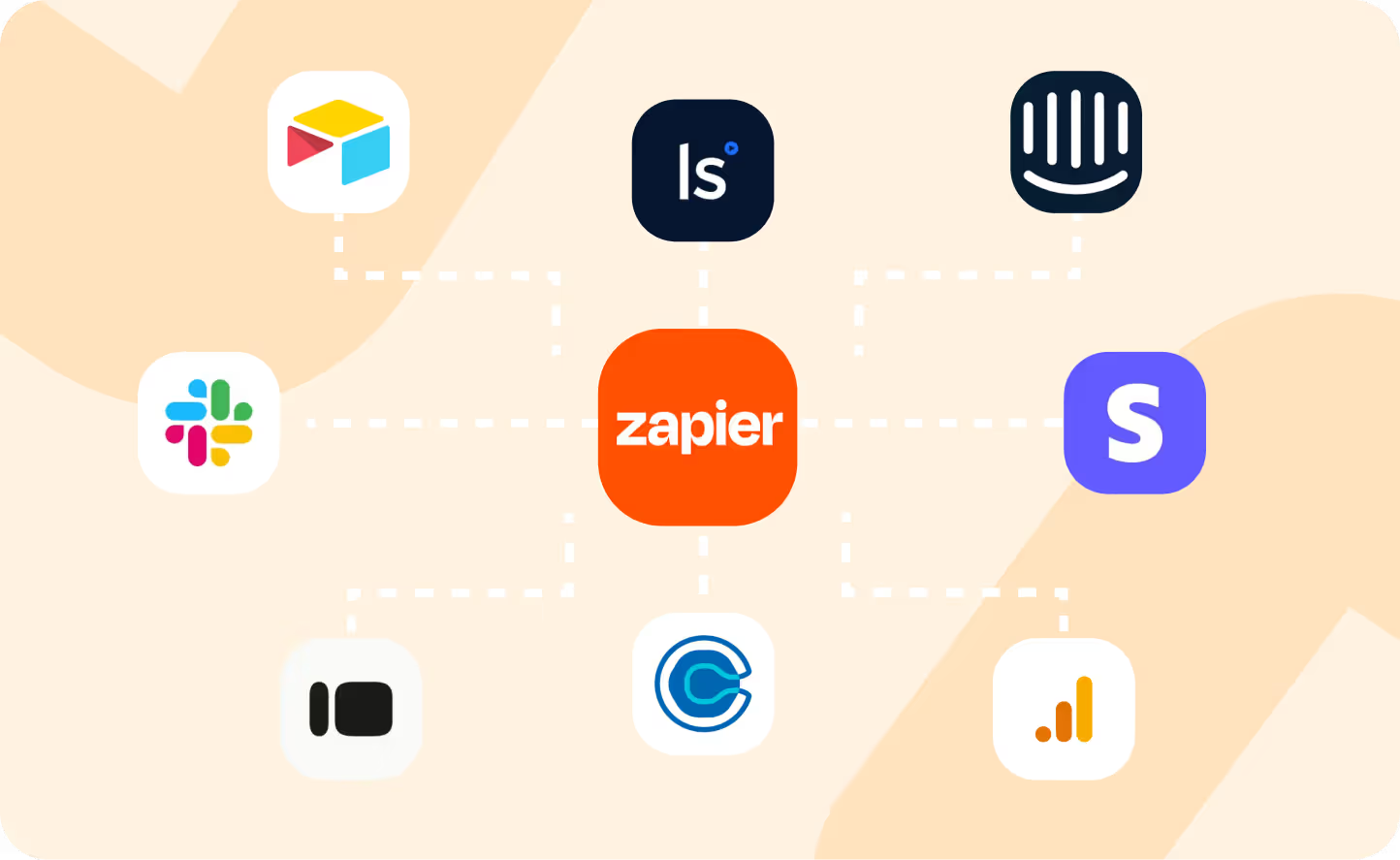8 Best eCommerce Platforms of 2025 for Your Online Store or Digital Product
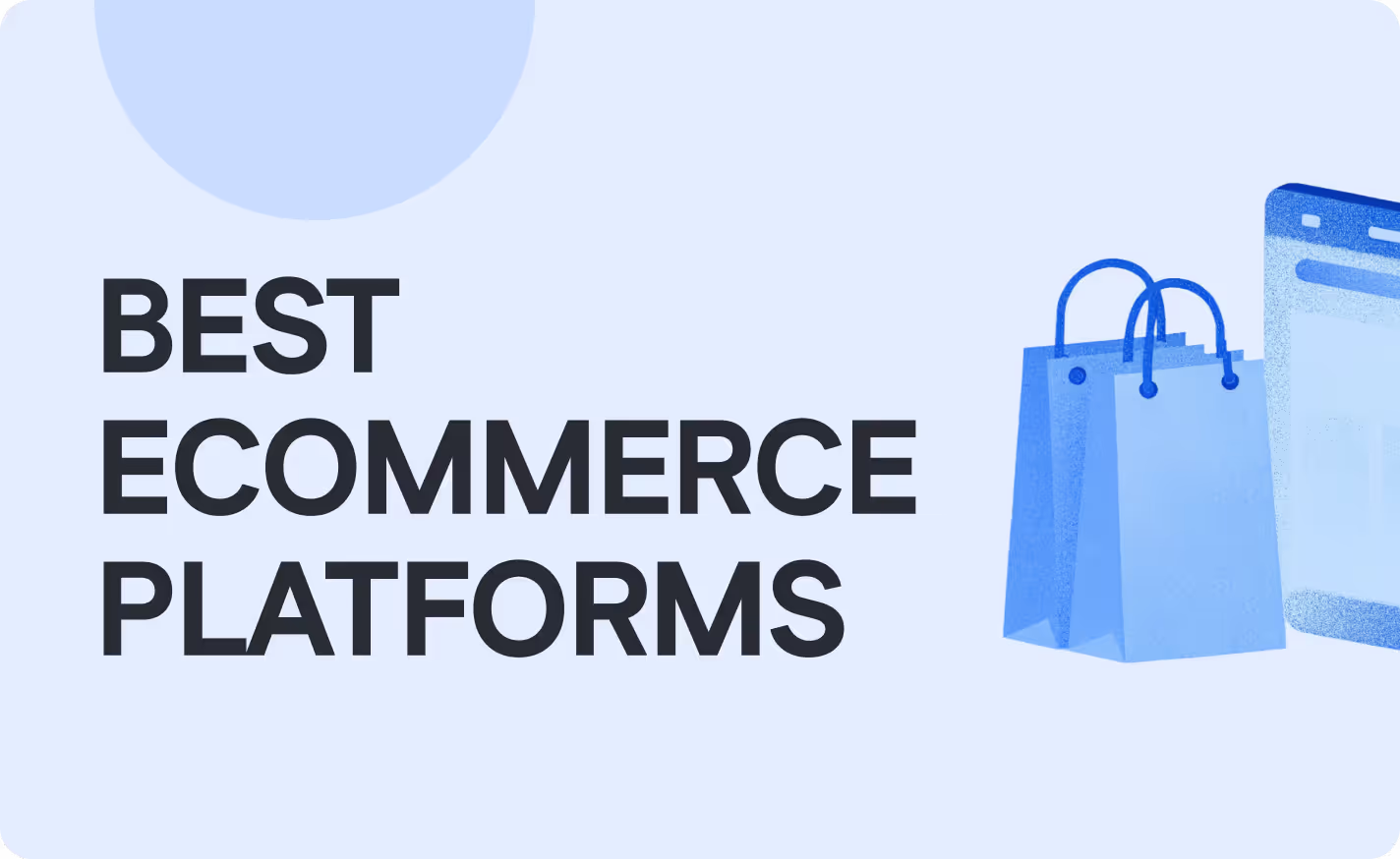
Introduction to eCommerce Platforms
Choosing the right eCommerce platform is a critical decision to grow your business, whether you're launching a new online store, scaling an existing brand, or selling digital products.
For years now we have been building a platform integrating seamlessly with Shopify or BigCommerce users.
Platforms of 2025 for eCommerce brands offer high diversity—from all-in-one store builders to specialized platforms for digital creators.
This article highlights the best eCommerce platforms available, helping you make an informed decision.
How We Evaluate and Compare Apps
To rank the best eCommerce platforms, we used the following criteria:
- Best for: The ideal user or business type the platform serves best.
- Key features: Essential tools and capabilities that set each platform apart.
- Pricing Information: Cost structure and any additional fees.
- Pros and cons: A balanced view of each platform's strengths and limitations.
Best eCommerce Platforms for Different Use Cases in 2025
- Shopify – Best for Growing Brands That Want an All-in-One Store
- BigCommerce – Best for Businesses Scaling with Flexibility
- Squarespace – Best for Creatives and Entrepreneurs
- Big Cartel – Best for Artists and Small-Scale Sellers
- Ikas – Best for eCommerce Platforms High Performer on G2
- Square Online – Best for Brick-and-Mortar Businesses Expanding Online
- Gumroad – Best for Creators Selling Digital Products & Memberships
- Whop - Best for Digital Product Creators & Membership-Based Businesses
Shopify – Best for Growing Brands That Want an All-in-One Store
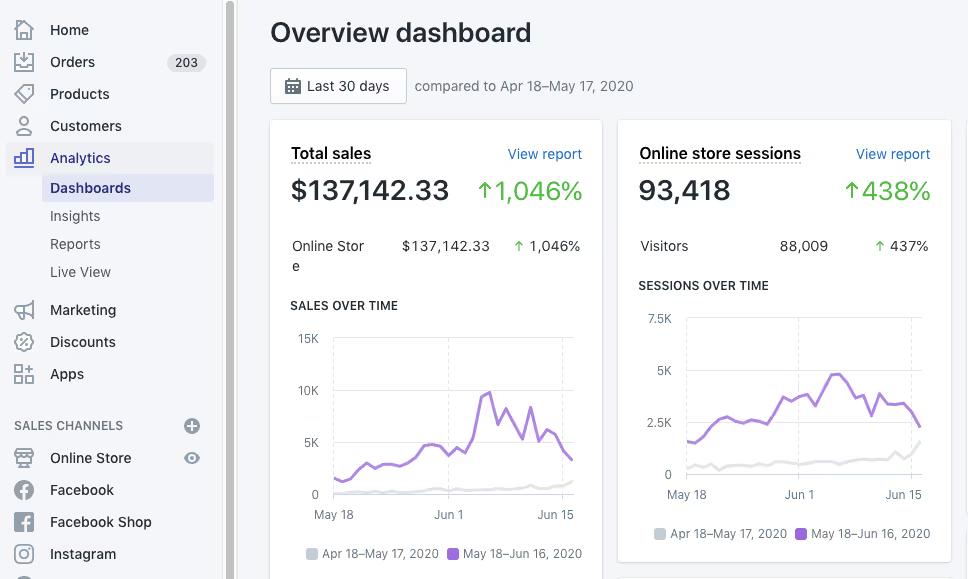
Best for Established and Starting Brands: Shopify
Shopify is the ideal ecommerce platform for brands looking to establish a comprehensive online store. Its all-in-one solution caters to businesses of all sizes, offering a user-friendly interface and robust features aimed at scaling ecommerce operations effectively.
Key Features
- In-person selling - POS: Seamlessly integrate physical and online sales for a unified customer experience.
- In-depth analytics and reporting: Gain valuable insights to drive informed decisions and optimize performance.
- Extensive commerce app integrations: Connect with numerous third-party applications to enhance your ecommerce website's functionality.
- Shipping management: Simplify logistics with built-in tools for efficient order fulfillment.
Pricing Information
Shopify offers a competitive pricing structure, starting at just $1/month for the first three months, transitioning to plans that begin at $36/month. While there’s no free tier, the pricing offers substantial features tailored to growing ecommerce businesses.
Pros and Cons
✅ Pros:
- High-converting checkout process
- Excellent support for multi-channel selling
- User-friendly website builder with customizable templates
❌ Cons:
- Transaction fees apply if not using Shopify Payments
- Limited features in lower-tier plans
- Initial setup may require a learning curve
Bonus: LiveSession integrates with Shopify to ensure your store converts by deeply understanding your sales funnels with session recordings of your shoppers.
BigCommerce – Best for Businesses Scaling with Flexibility
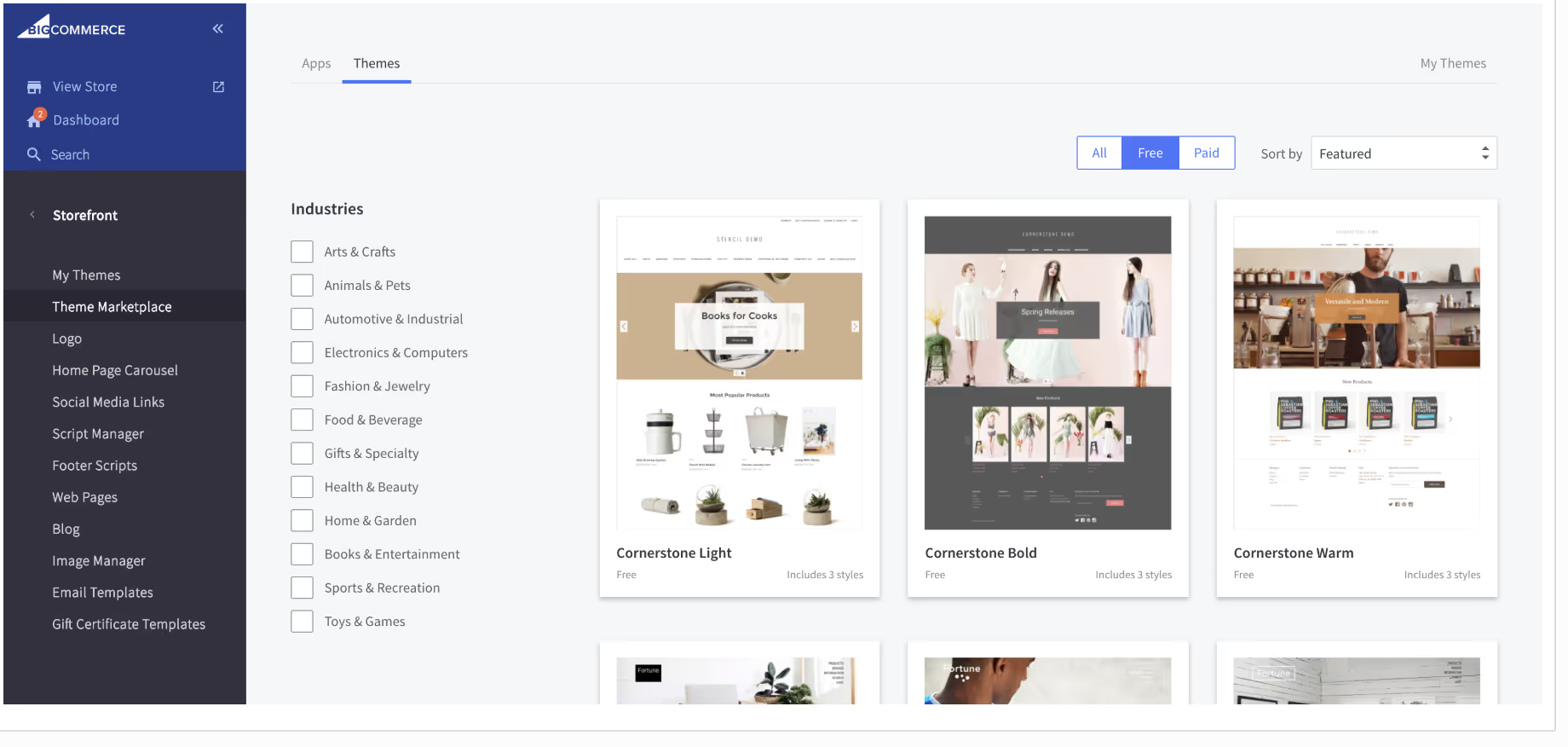
Best for Scaling with Flexibility: BigCommerce
BigCommerce is ideal for growing businesses seeking deep customization and scalability in their ecommerce operations. This platform empowers users to build sophisticated online stores while adapting to evolving business needs.
Key Features
- Drag-and-drop page builder: Simplifies the website design process, allowing users to create stunning ecommerce sites effortlessly.
- Advanced SEO tools: Enhances visibility and ranking on search engines, driving organic traffic to your online store.
- Multi-storefront capability: Enables management of multiple stores from a single account, perfect for diverse product lines or brands.
- Social selling features: Integrates with social media platforms, allowing businesses to reach customers where they spend their time.
- Seamless WordPress connection: Facilitates easy integration with WordPress for users seeking robust blogging capabilities alongside their ecommerce site.
Pricing Information
BigCommerce plans start at $39/month for businesses generating up to $50K in online revenue. There is a free trial available, allowing users to explore features before committing. Additional costs may apply for advanced integrations and third-party apps.
Pros and Cons
✅ Pros:
- Excellent for SEO and scalability
- Strong security features
- Comprehensive customer support
❌ Cons:
- Steeper learning curve for beginners
- Limited free options compared to platforms like Shopify
- Some advanced features may require additional costs
Bonus: LiveSession integrates with BigCommerce to ensure your store converts by deeply understanding your sales funnels with session recordings of your shoppers.
Squarespace – Best for Creatives and Entrepreneurs
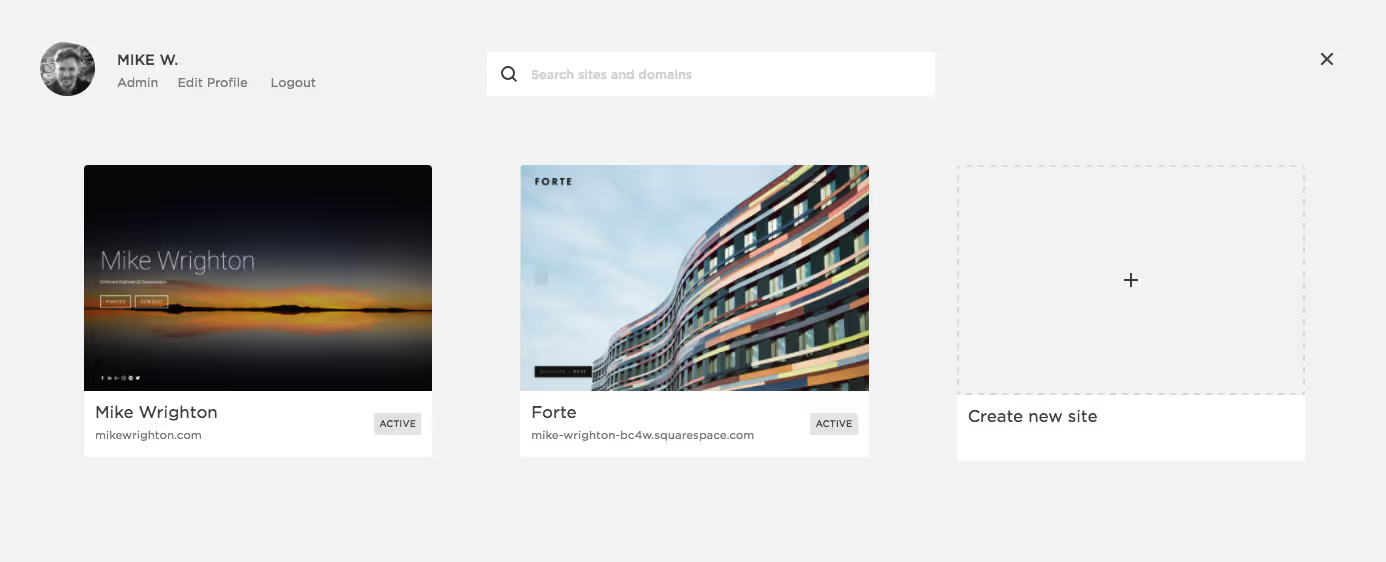
Best for Creatives and Entrepreneurs: Squarespace
Squarespace excels as an ecommerce website builder tailored for creatives and entrepreneurs focused on design and branding. Its visually stunning templates and user-friendly interface make it the ideal choice for those looking to create an impactful online presence.
Key Features
- Beautiful, high-quality templates: Offers visually appealing designs that enhance branding.
- AI-powered site building: Simplifies website creation, allowing users to focus on creativity rather than technical details.
- SEO and analytics tools: Helps optimize online visibility and track performance metrics effectively.
- Built-in payment processing: Streamlines transactions, making it easier to manage an online store.
- Customer accounts and memberships: Facilitates community building and recurring revenue through memberships.
Pricing Information
Squarespace plans start at $16 per month, which includes a free trial to explore features. Paid plans provide additional functionalities for growing ecommerce businesses, though transaction fees on digital content and memberships may be higher than competitors.
Pros and Cons
✅ Pros:
- Stunning design and templates
- Good built-in features
- User-friendly interface
❌ Cons:
- Higher transaction fees on digital content
- Limited integrations compared to platforms like Shopify
- Some customization options may require coding knowledge
In summary, Squarespace offers a comprehensive ecommerce solution ideal for creatives aiming to build a visually striking online store.
Big Cartel – Best for Artists and Small-Scale Sellers
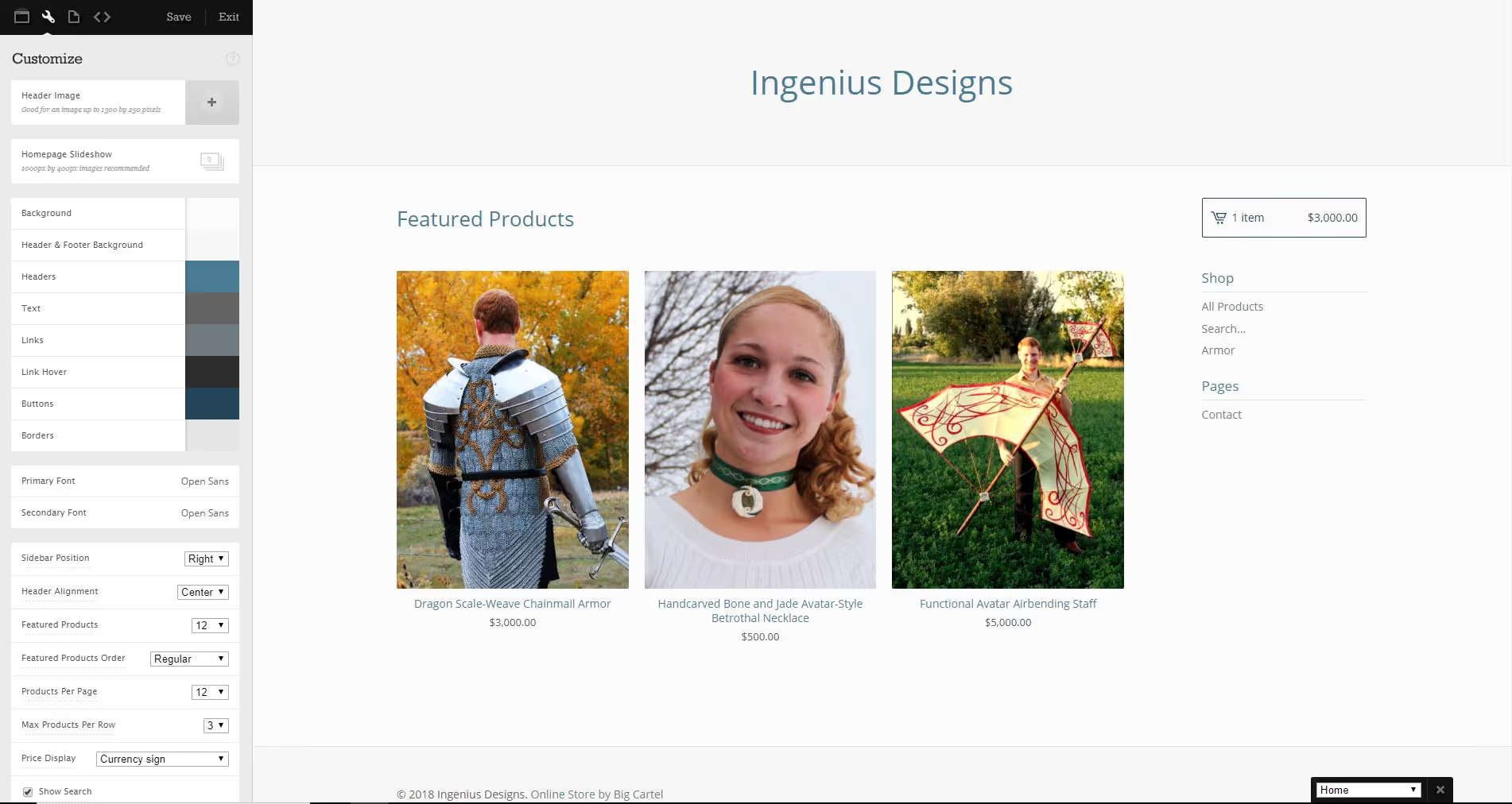
Best for Artists and Small-Scale Sellers: Big Cartel
Big Cartel is an ideal ecommerce platform for artists and small businesses looking for a straightforward and affordable way to set up an ecommerce store. This platform is best for creative entrepreneurs who want to showcase their unique products without dealing with the complexity of larger ecommerce software solutions.
Key Features
- Free SEO-optimized templates: Easily create an attractive e-commerce website that boosts visibility.
- Real-time sales dashboard: Track your ecommerce store performance and key metrics effortlessly.
- Import products from other platforms: Streamline setup by transferring existing listings with ease.
- Mobile apps for store management: Manage your online store on the go, ensuring a seamless online shopping experience.
Pricing Information
Big Cartel offers a free plan, with paid options starting at $15 per month. The free plan allows for a limited number of product listings, while paid plans provide features like enhanced customization and increased product capacity to scale your business.
Pros and Cons
✅ Pros:
- Simple setup and user-friendly interface – perfect for those new to building an ecommerce website.
- Free plan available for new sellers – a great entry point for a business owner starting an ecommerce store.
- Customizable templates to reflect your brand and enhance ecommerce experiences.
❌ Cons:
- Limited product listings on the free plan – may not suit successful online stores looking to expand.
- Fewer customization options compared to larger platforms – for those needing an open-source ecommerce platform.
- May not scale well for larger businesses – lacks advanced ecommerce features for high-growth brands.
Ikas – Best for eCommerce Platform High Performer on G2
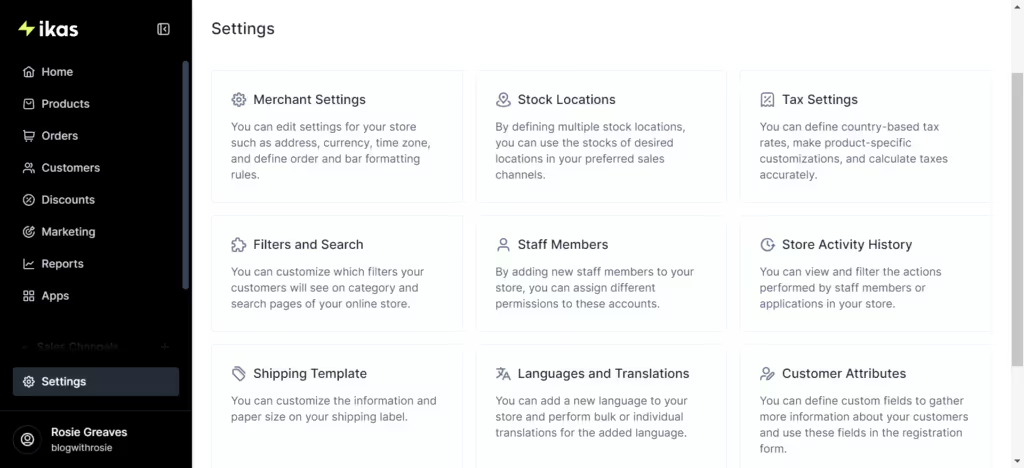
Best for: Businesses Wanting Automation, Localization, and High Performance on G2
Ikas stands out as a high-performing ecommerce platform designed for business owners seeking automation, localization, and scalability. This platform is a software solution that simplifies running an online store while ensuring an excellent online shopping experience.
Key Features
- SEO-Optimized Platform: Enhances visibility for your e-commerce website.
- Abandoned Cart Reminders: Helps recover lost sales and improve ecommerce experiences.
- Multilingual Store Support: Enables business growth by reaching international audiences.
- Location-Based Redirects: Ensures a localized and personalized ecommerce shopping cart experience.
- Sales Reporting and Analytics: Offers detailed insights for successful online stores.
Pricing Information
ikas offers competitive pricing starting at €25 per month, making it a great choice for your business. It includes a free trial, allowing business owners to explore its powerful ecommerce features before committing.
Pros and Cons
✅ Pros:
- Strong localization features – helps businesses expand globally
- Unlimited product uploads and traffic – essential for a platform that supports scalability.
- User-friendly website builder – simplifies building an ecommerce website.
❌ Cons:
- Less global recognition compared to Shopify and BigCommerce – not as widely adopted.
- Limited third-party app integrations – some ecommerce platforms require additional apps.
- May require additional customization for advanced needs – an open-source ecommerce platform might be a better fit for some users.
Ikas is a smart ecommerce platform for those who need automation, localization, and ecommerce software designed for scalability.
Square Online – Best for Brick-and-Mortar Businesses Expanding Online
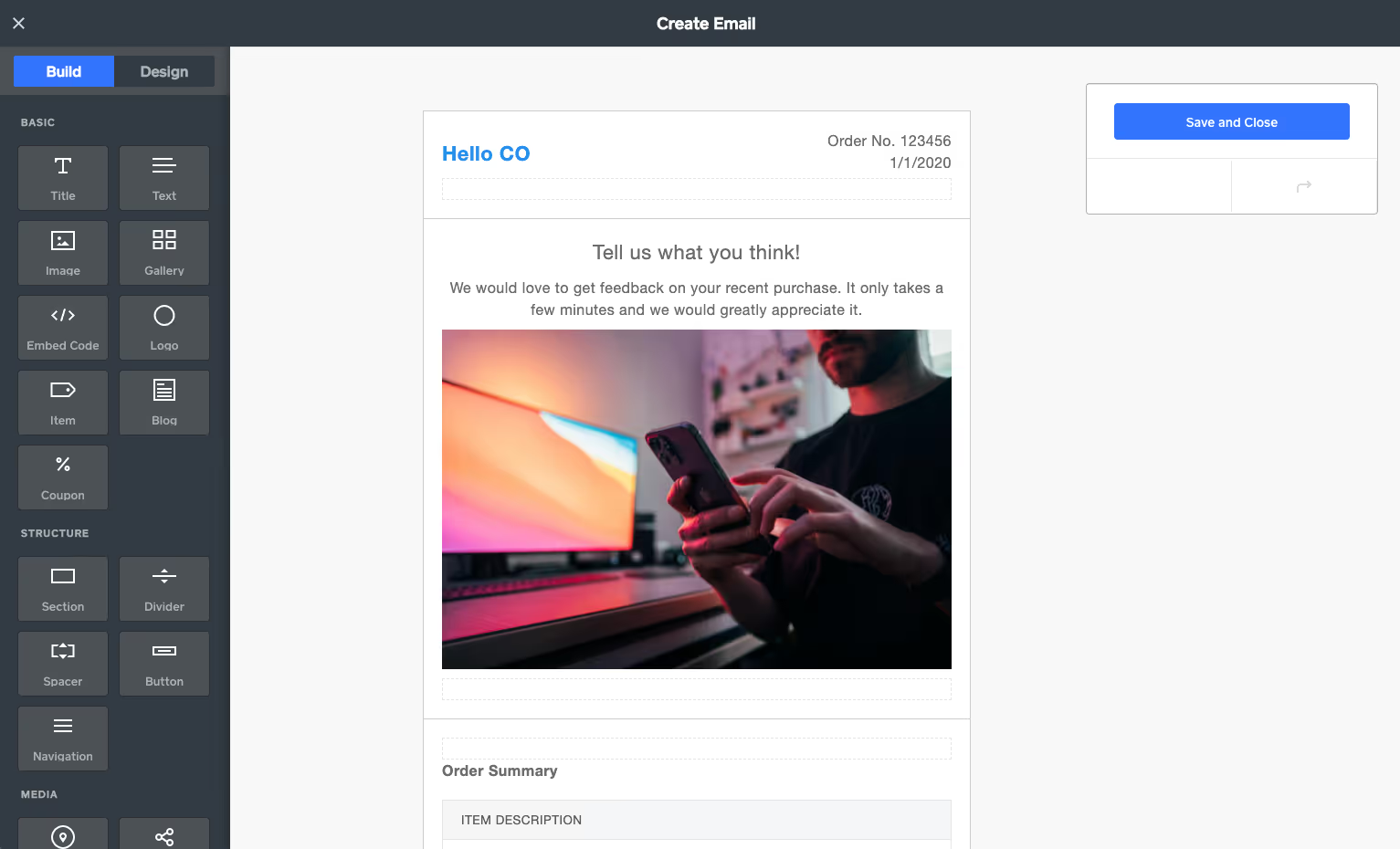
Best for Brick-and-Mortar Businesses Expanding Online: Square Online
Square Online is ideal for business owners already using Square POS and looking to extend their ecommerce store. This platform gives retailers the best of both worlds—a physical and digital presence—seamlessly syncing online and offline sales.
Key Features
- SEO and Marketing Tools: Enhance visibility and improve your online shopping experience.
- Full Sync with Square POS: Ensures real-time inventory and sales tracking.
- Pickup & Local Delivery Options: Offers flexible checkout solutions within the ecommerce shopping cart.
- Customer Accounts: Enables personalized interactions and repeat sales.
- Social Selling and Multiple Payment Options: Expands sales through social media and flexible payment methods.
Pricing Information
Square Online offers a free plan, with paid tiers starting at $29 per month. Keep in mind its transaction fees of 2.9% + 30¢ per sale, which may impact business growth.
Pros and Cons
✅ Pros:
- Best for your business if you're already using Square POS.
- Free plan available – ideal for businesses testing the waters.
- User-friendly interface – great for choosing an ecommerce platform with minimal learning curves.
❌ Cons:
- Higher transaction fees – costs can add up for high-volume sellers.
- Limited design customization options – compared to other types of ecommerce platforms.
- May require third-party apps for advanced features – some platforms to choose from may offer more built-in functionality.
Gumroad – Best for Creators Selling Digital Products & Memberships
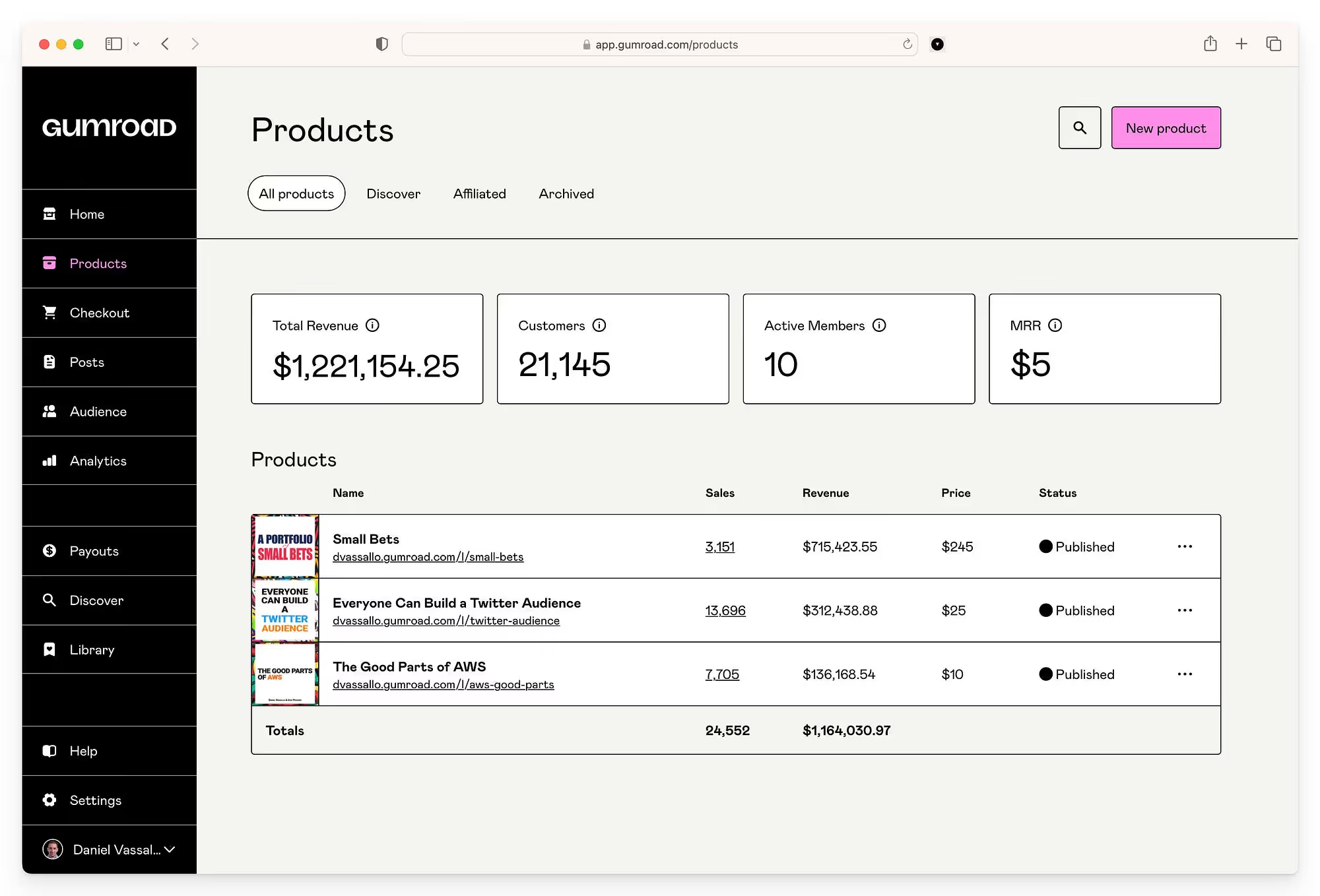
Gumroad is the best ecommerce platform for digital product creators looking to sell e-books, courses, and memberships. It’s designed for simplicity and ease of use, making it a top platform for entrepreneurs focusing on digital sales.
Key Features
- Sell Digital Products – Effortlessly distribute e-books, courses, and more through your ecommerce store.
- Memberships – Monetize ongoing content with a subscription-based ecommerce platform.
- Payment Options – Accept payments via PayPal and direct deposits for added convenience.
- Transaction-Based Pricing – No monthly fees, making it a cost-effective solution for creators.
- Simple Interface – Easily manage sales and optimize business growth.
Pricing Information
Gumroad follows a transaction-based pricing model, charging 10% plus a $0.50 fee per sale. There are no monthly fees, making it a basic ecommerce solution for independent creators.
Pros and Cons
✅ Pros:
- No monthly fees – only pay when you sell
- Easy-to-use interface for running an online store
- Flexible payment options for global customers
❌ Cons:
- High transaction fees can add up
- Limited customization compared to headless ecommerce platform options
- Basic analytics tools may not meet all business needs
Whop - Best for Digital Product Creators & Membership-Based Businesses
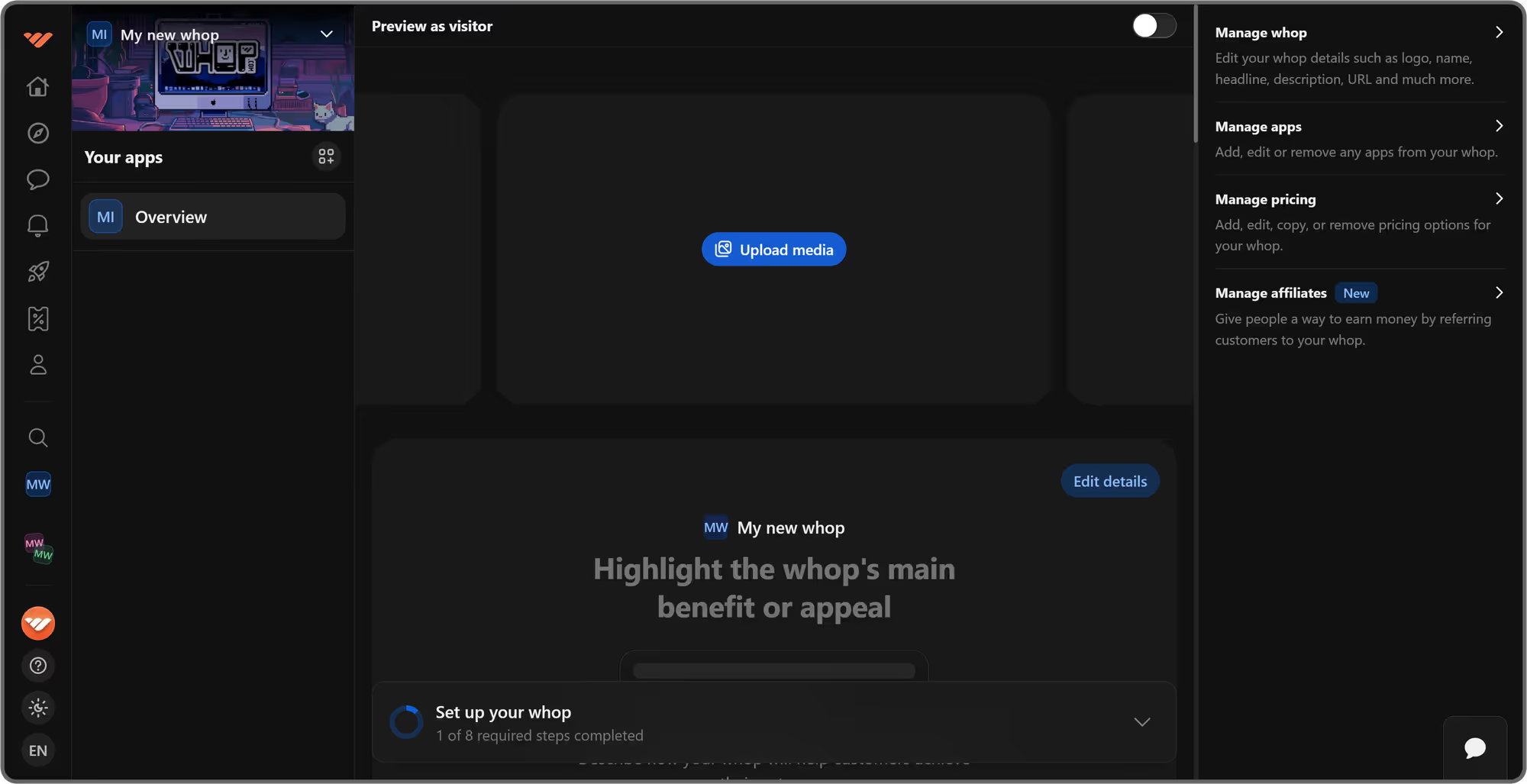
Whop is an innovative e-commerce platform designed specifically for digital product creators and membership-based businesses. Its focus on community access and integrated solutions makes it an ideal choice for entrepreneurs looking to monetize their digital offerings.
Key Features
- Integrated Payment System: Simplifies transactions, allowing creators to easily manage sales.
- Bundling Capabilities: Enables users to combine products, increasing sales potential.
- Analytics and Reporting Tools: Provides insights into user behavior, helping to optimize offerings.
- Community-Building Features: Fosters engagement among members, enhancing retention.
- Marketplace Access: Connects users to a larger audience, expanding sales opportunities.
Pricing Information Whop operates with a competitive pricing model, including a 3% platform fee plus standard payment processing fees. Additionally, marketplace sales incur a fee of up to 30%. While there are no entry fees, users should consider these costs when budgeting.
Pros and Cons
✅ Pros:
- Comprehensive tools for digital sales and community engagement
- Access to a diverse marketplace audience
- No upfront fees for entry
❌ Cons:
- Platform and payment processing fees can accumulate quickly
- Higher fees for marketplace sales may deter some users
- Limited customization options compared to other e-commerce solutions
See Why Shoppers Leave Your Store Empty-Handed
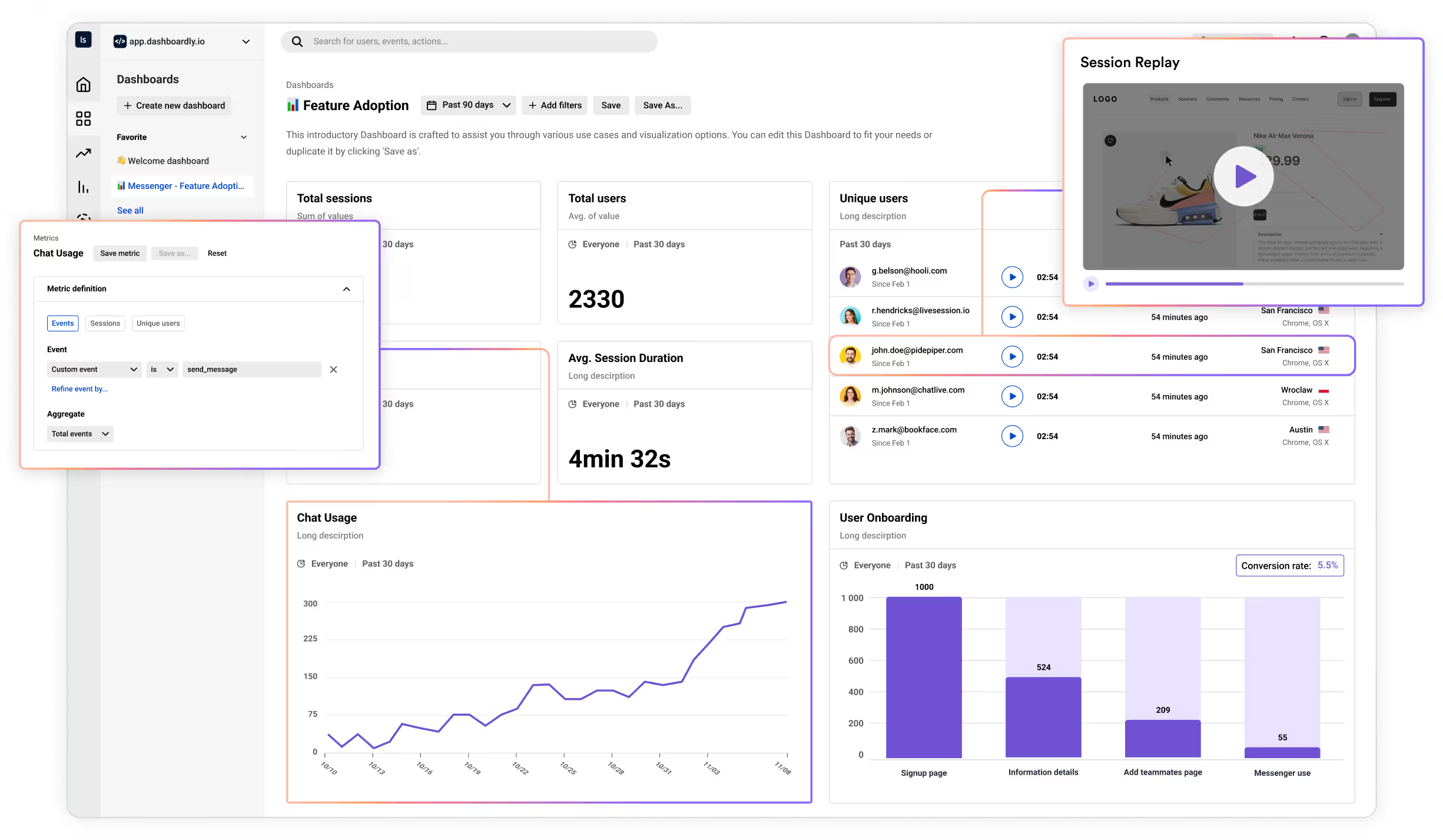
Ever wonder what happens before a customer abandons their cart? With LiveSession's integration with Shopify and other eCommerce platforms, you finally get to see the whole story.
When shoppers visit your store, they leave digital footprints with every click, pause, and scroll. But most analytics only tell you what happened—not why. This integration changes everything.
Watch real shopping sessions unfold. See exactly where customers get stuck, what products they linger on, and what makes them leave. It's like sitting beside your shoppers as they browse your store.
With this insight, you can:
- Fix confusing checkout processes that drive customers away
- Discover which product images grab attention (and which don't)
- Understand why certain items get added to cart but never purchased
- See how shoppers interact with your product descriptions and pricing
Stop guessing what your customers want. Start watching what they actually do. When you connect LiveSession with your eCommerce platform, you transform anonymous traffic into clear, actionable insights that boost conversions and sales.
The result? A store that sells because it's built around real customer behavior—not assumptions. Try now
Related articles
Get Started for Free
Join thousands of product people, building products with a sleek combination of qualitative and quantitative data.

